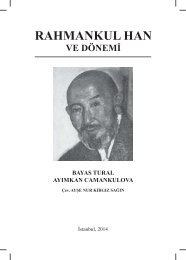THE SOVIET HISTORIOGRAPHY AND THE QUESTION OF KAZAKHSTAN’S HISTORY
SOVYET-TARIH-YAZICILIGI-ENG
SOVYET-TARIH-YAZICILIGI-ENG
Create successful ePaper yourself
Turn your PDF publications into a flip-book with our unique Google optimized e-Paper software.
<strong>THE</strong> <strong>QUESTION</strong> <strong>OF</strong> <strong>KAZAKHSTAN’S</strong> <strong>HISTORY</strong> 141<br />
and early 1950s, Stalinist ideologues initiated a new struggle against<br />
the intellectuals.<br />
In 1946, the post-war phase started with the USSR CP Central<br />
Committee pressuring the magazines “Zvezda” and “Leningrad”, drama<br />
theatres and their repertoires, and the movie “Bolshaya Zhizn”. At<br />
this point, the decision taken by the Kazakhstan CP Central Committee<br />
on 21 January 1947 named the “Kazakh SSR Academy of Sciences<br />
Language and Literature Institute’s significant political faults on its<br />
works” yielded negative outcomes. 237 On 27 August 1948, with the<br />
approval of Kazakhstan CP Central Committee, the Kazakh SSR Academy<br />
of Sciences complied with the decision. In accordance with the<br />
decision, all institutes, as well as the biology and medicine centres of<br />
the Academy, were compelled to revise their scientific research topics<br />
and research-development plans, and tighter control was applied to<br />
institutions of higher education and doctoral dissertation topics. 238<br />
On the other hand, between the 1930s and the 1950s, Kazakhstan –<br />
especially Almaty – became the harbour for exiled, talented scholars<br />
and artisans of the Soviet Union, including primarily S. Eizenshtein,<br />
Roshal, M. Zoshenko, K. Paustovskiy, S. Marshak, V. Shklovskiy, and A.<br />
Nikolskaya. The “Vanguard Organs of Proletarian Supremacy” chased<br />
them and other society-friendly people. 239<br />
Immediately thereafter, the regime started a campaign against “Tsarists”,<br />
Kazakh “nationalists” and “bourgeois-lovers”. Among the branches<br />
of Kazakh SSR Academy of Sciences, and generally among intellectuals,<br />
fear and doubt became eminent. That is to say, the 1937 syndrome<br />
re-appeared and comparable societal conditions echoed the earlier era. 240<br />
First, poets and authors felt a strong sense of persecution. Their<br />
works became hotspots of debates and they experienced persecution<br />
on the pretext of not complying with the Soviet ideology.<br />
Between 1947 and 1954, the well-known writer Muhtar Avezov<br />
felt persecuted on the bases of being a “retrogressive nationalist”,<br />
237 Takenov, A., “Elüvinşi jıldardın basında Qazaq tariyhı qalay qıspaqqa alındı?”, Qazaq Tariyhı,<br />
1994, No1, p. 3.<br />
238 Süleymenov, R., Guryeviç. B., Ya, L. “Lysenkovşina v Kazahstane”, İzvestya AN RK, Serya<br />
Obşetvennyh Nauk, 1992, No3.<br />
239 Nurpeyis, K., E. “Bekmakhanov pen onun kitabi kalay jazıldı?”, Qazaq Tarihi, 2005, No2.<br />
pp. 5-13; Takenov, A., “Elüvinşi jıldardın basında Qazaq tariyhı qalay qıspaqqa alındı?”, Qazaq<br />
Tariyhı, 1994, No1, p. 3; Süleymenov, R., Guryeviç. B., Ya, L. “Lysenkovşina v Kazahstane”,<br />
İzvestya AN RK, Serya Obşetvennyh Nauk, 1992, No3; Jurtbay, T., “Eto Napisano v Kritiçeskuyu<br />
Poru”, Abay, 1996, No2.<br />
240 Nurpeyis, K., E. “Bekmakhanov pen onun kitabi kalay jazıldı?”, Qazaq Tarihi, 2005, No2.<br />
pp. 5-13.



